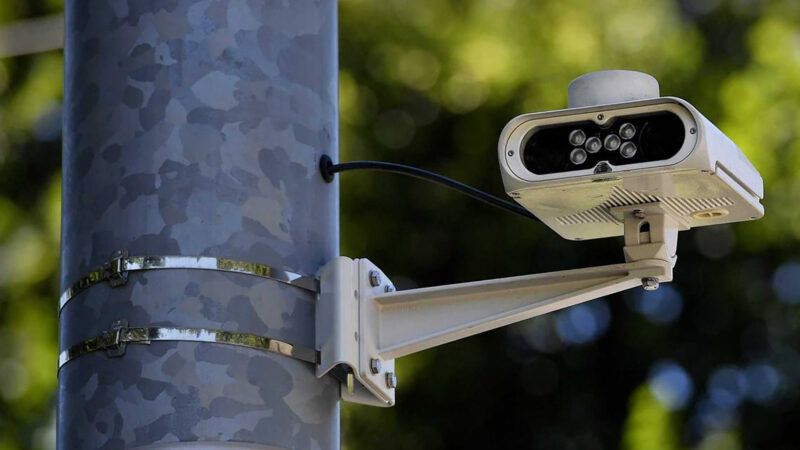Automated License Plate Readers Are Watching You
The technology enables routine surveillance that would have troubled the Fourth Amendment’s framers.

Last month, Charlie Wolf attended a meeting of the Greers Ferry, Arkansas, city council to complain about a license plate camera that he said was violating the Fourth Amendment by regularly taking pictures of his driveway and front yard. Greers Ferry Police Chief Kallen Lacy acknowledged Wolf's "distress" but rejected his legal analysis, saying "over 5,000 cities" across the country use such cameras, "so there is no constitutional violation there."
Despite Lacy's assurance, the widespread acceptance of automated license plate readers (ALPRs) as a crime-fighting tool only magnifies the privacy concerns they raise. They enable routine surveillance of a sort that would have troubled the Fourth Amendment's framers.
"Unlike red-light cameras or speed cameras that are triggered by specific violations," the Institute for Justice notes, ALPRs "photograph every vehicle that drives by and can use artificial intelligence to create a profile with identifying information that then gets stored in a massive database. Once that happens, officials can search the database for any vehicle they wish, all without a warrant."
Worse, "departments around the country are automatically sharing data with each other, making it simple for police anywhere to track drivers' movements. All of this arbitrary discretion threatens people's privacy, security, and freedom of movement by creating an atmosphere where everyone knows they are being watched and tracked whenever they hit the road."
Wolf's experience crystallizes these concerns. As he noted at the city council meeting, the camera that was installed across the street from his house on May 13 was photographing "our yard, curtilage, and vehicles" whenever a car passed by.
"We're being photographed and entered into a database without consent or violation of any law," Wolf said. The camera captured images of Wolf and his wife whenever they left their home or returned to it.
The camera also documented the comings and goings of the Wolfs' visitors, including their friends, children, and grandchildren. Depending on the vagaries of traffic, it might record trips to the mailbox, kids playing in the yard, or anything else happening in front of the house.
Local officials initially were unfazed by the Wolfs' complaints, insisting that the camera, one of five installed in the tiny town under a contract with the ALPR company Flock Safety, would stay where it was. But they reconsidered after receiving a letter from Institute for Justice attorney Joshua Windham, who explained why the couple's objections deserved more respect than they had received.
In 2018, Windham noted, the Supreme Court held that the FBI violated the Fourth Amendment when it collected cell phone location data without a warrant supported by probable cause. That ruling, he explained, was based on the principle that the Fourth Amendment "must preserve at least as much privacy as Americans would have enjoyed when it was adopted."
Back then, Windham observed, "police lacked the means to create a historical record of people's physical movements" because "they simply did not have the manpower or the technology to do so." He noted that a federal judge in Iowa and two state supreme courts have recognized that "the placement of a surveillance camera in front of a home," like tracking someone's movements via cell phone data, "may violate a reasonable privacy expectation."
The morning after Windham sent that letter, Greers Ferry officials posted a defense of ALPRs that read like a Flock press release. But by the end of the month, they had agreed to remove the camera that was spying on the Wolfs.
That small victory for privacy was followed a week later by another encouraging development: Scarsdale, New York, terminated its ALPR contract with Flock Safety after more than 400 residents signed a petition expressing concern about "the broad and lasting implications of deploying such a surveillance system."
The official rationale for the town's decision was a lack of funding. But the criticism provoked by the project suggests Americans are beginning to recognize the perils of surrendering their privacy in the name of public safety.
© Copyright 2025 by Creators Syndicate Inc.
